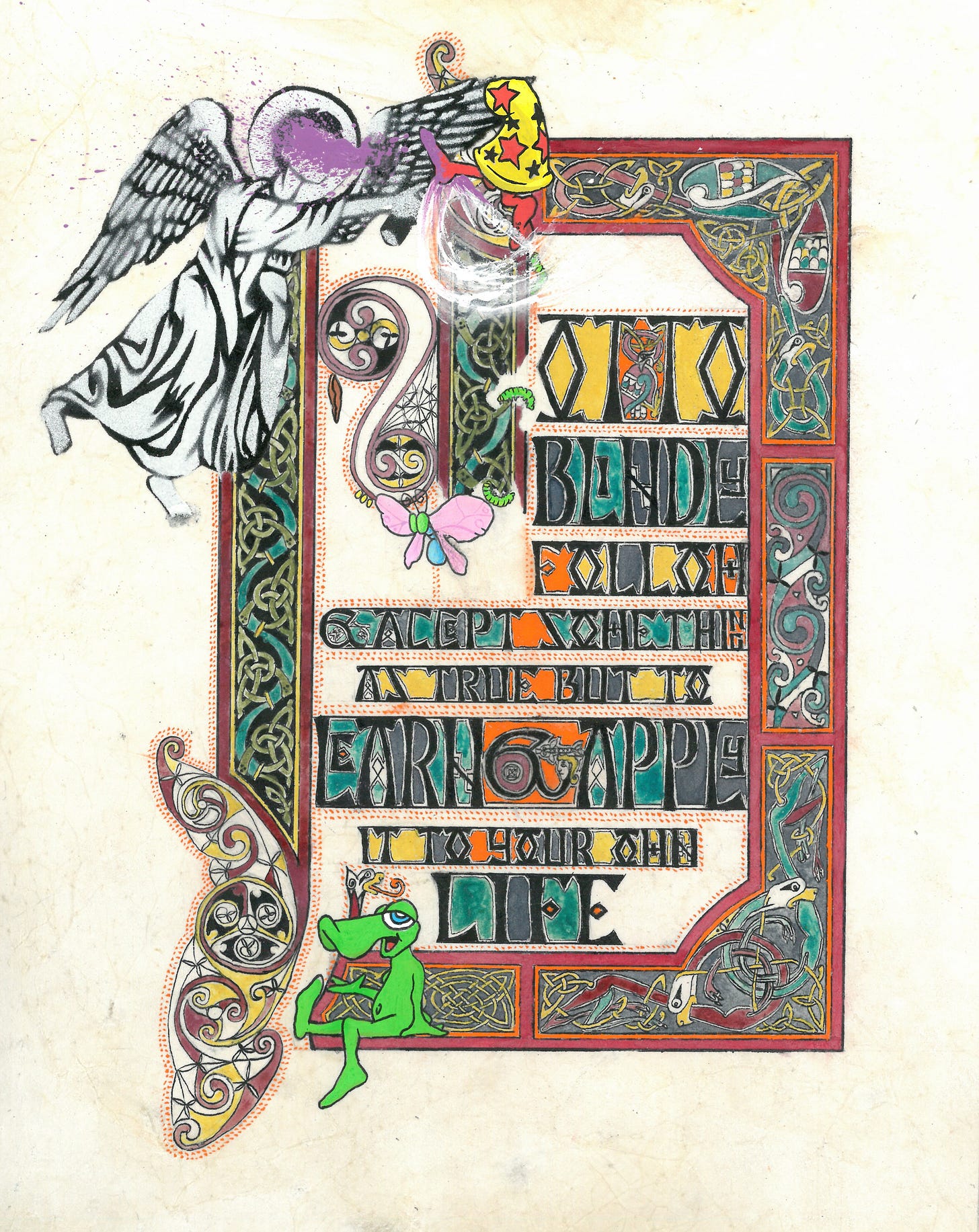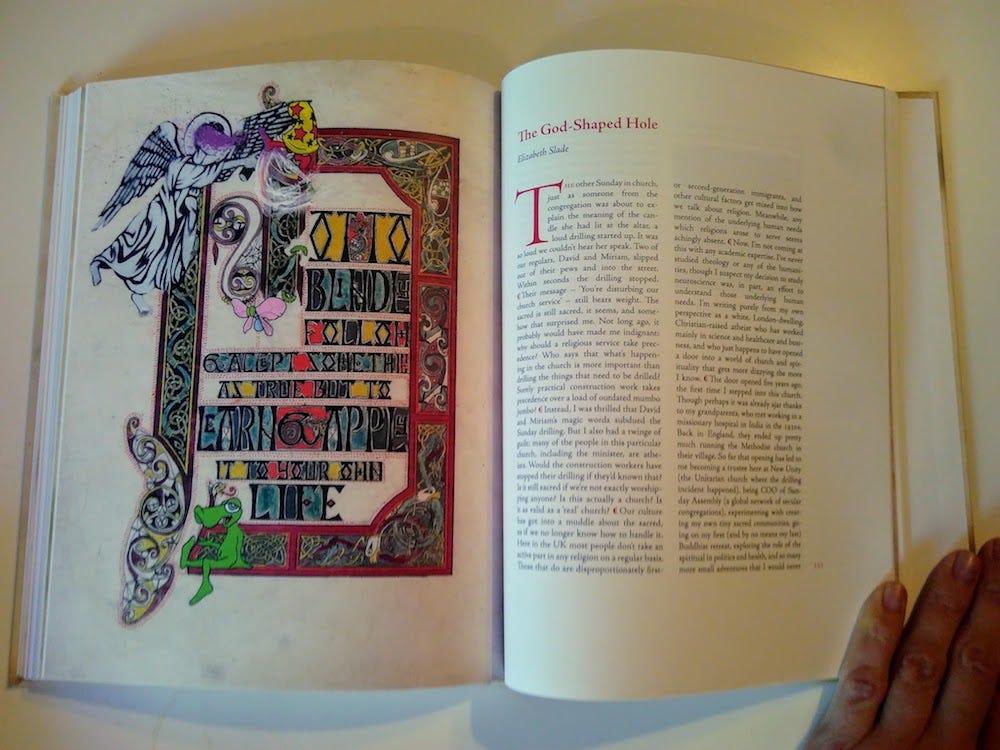This week’s post is a long read from our 2017 issue SANCTUM that revolves around the theme of ‘the sacred’. Here Elizabeth Slade investigates the space left by the collapse of institutional religion in much of the West and her experience as a rationalist atheist who felt something important might have gone missing when people stopped going to church.
For those who would like to explore the subject further, she will be holding a session inspired by this essay on 31st July, 17:30-18:45pm BST (sign up here) with the Raft, a gathering place for people committed to cultivating a sound society through practical skills, mystical inquiry, and active citizenship.

Looking back at this essay I wrote in 2017 feels like time travel – encountering my mid-30s self from the position of my mid 40s, someone who didn’t know we’d encounter a pandemic, a second term of Trump, a further fraying of the social norms, a clearer sense of ‘business as usual’ being the problem, a growing recognition of the inevitability of collapse. I also had no clue then that I would end up leading the UK’s Unitarian organisation.
Part of my reason for committing to this work is that I’ve learnt how essential the practices of spiritual community are for the times in which we find ourselves – places where we can practise taking care of each other, learning how to find stillness in uncertainty, to access the best of human and more-than-human wisdom, and where we can step out of the status quo, and orient ourselves to an idea of community and kin-dom shaped by shared values and virtues, with all the messiness those practice grounds bring. (LS)
THE OTHER SUNDAY IN CHURCH, just as someone from the congregation was about to explain the meaning of the candle she had lit at the altar, a loud drilling started up. It was so loud we couldn’t hear her speak. Two of our regulars, David and Miriam, slipped out of their pews and into the street. Within seconds the drilling stopped.
Their message – ‘You’re disturbing our church service’ – still bears weight. The sacred is still sacred, it seems, and somehow that surprised me. Not long ago, it probably would have made me indignant: why should a religious service take precedence? Who says that what’s happening in the church is more important than drilling the things that need to be drilled? Surely practical construction work takes precedence over a load of outdated mumbo jumbo?
Instead, I was thrilled that David and Miriam’s magic words subdued the Sunday drilling. But there was a twinge of guilt: many in that particular church, including the minister, are atheists. Would the construction workers have stopped their drilling if they’d known that? Is it still sacred if we’re not worshipping anyone? Is this actually a church? Is it as valid as a ‘real’ church?
Our culture has got into a muddle about the sacred, as if we no longer know how to handle it. Here in the UK most people don’t take an active part in any religion on a regular basis.
When I stepped through an open door into this church as a non-believer, maybe it was already ajar thanks to my grandparents, who met in a missionary hospital in India in the 1930s and pretty much ran the Methodist church in their village.
That opening saw me become a trustee here at New Unity, the Unitarian church where the drilling happened, being COO of Sunday Assembly, a global network of secular congregations, experimenting with creating my own tiny sacred communities, going on my first and by no means last Buddhist retreat, exploring the role of the spiritual in politics and health, and so many small adventures I never saw coming that first Sunday morning.
The sky and the ground
I was looking for something, to scratch an itch of dissatisfaction, I had a fulfilling job and was ‘successful’. I’d been googling voluntary work and wondering about more therapy, but neither seemed quite right. And when I saw that the church down the end of my street was led by a minister who was an atheist with an MBA and used to be a scientist at MIT, that felt like safe territory. Voluntarily setting foot in a church still seemed alien, though.
I was firmly cynical about religion. When friends got married in church, it irked me, and I’d refuse to sing the bits of hymns that mentioned God. I found it easy to be angry about plenty of the things that are done in the name of religion, from faith schools to oppressing women’s rights. I’d grown up in a Christian family and gone to Sunday School as a kid, which was on a Wednesday, but my belief fell away as a teenager, part of the slow realisation that not everything your parents and teachers tell you is true.
I hold The X-Files partly responsible: there were a lot of aliens about in the mid-90s, and at a service one Christmas in the village church I realised that the readings didn’t recognise the possibility of life on other planets. If God is universal and omnipotent, you’d think He would have made sure that intergalactic life got a mention in the Bible. ‘Aha! I’ve caught you out!’ Welcome to my smug teenage loss of faith.
Church was a place you went to be told that you’re bad and that you have to follow the rules. I was already pretty good at feeling bad about myself and pretty good at following rules
It didn’t really feel like a loss: church was a place you went to be told that you’re bad and that you have to follow the rules. I was already pretty good at feeling bad about myself and pretty good at following rules, and I wasn’t sure what else I was supposed to be getting from it.
At the Unitarian church that first time, I didn’t imagine anything would stick. I felt awkward and embarrassed. It would be horrendous if I saw anyone I knew. How would I justify being in such a place?
That morning the sermon was about cynicism. The minister talked about how easy it is to hide behind a veil of cynicism and to avoid actually engaging in life. I knew I’d been called out. My friends and I were happily skating on a safe veneer of snarkiness that protected us from actually caring. It touched a nerve.
The format of the service was recognisably churchy, only with no mention of God. No prayer, no rules, no dogma. We sang hymn-shaped songs, but they were about navigating life rather than worshipping God. There were a few minutes of silent meditation and a sermon that was a million miles from my childhood recollections. The minister’s words were full of hope while pulling no punches. As he says each week, ‘I hope you hear something that makes you just uncomfortable enough to grow.’ And each week, there is a chance for members of the congregation to speak about what’s happening in their lives, to light candles of joy and sorrow, and to say a few lines about what’s going on for them.
My sporadic attendance, when I was around and not too hungover, built up to listening in but not really speaking to anyone. I started to recognise a welcome space of peace and reflection, and I shifted from consumer to contributor. I went along to after-service meetings about social justice: what were we going to do as a community to make the world a better place? OK, so the meetings were a bit ineffective, but the minister spotted my frustration, recognised my organisational skills and invited me to join the committee that runs the church. A casual enquiry reached me about organising an event at church for International Women’s Day, and my email response offered a very tentative maybe – along with a full project plan that clarified aims, set out a budget and defined a timeline.
That was it: no longer would I slip quietly into the pews, enjoy the reflection and music and then slip away again. Organising the event connected me to the congregation, and the fact that I brought something into fruition felt incredible. I’d taken it from idea to reality, and it was a success. That type of creative endeavour was something I hadn’t really led before, and a new part of me got switched on, a new sense of agency: I was making things happen outside work.






